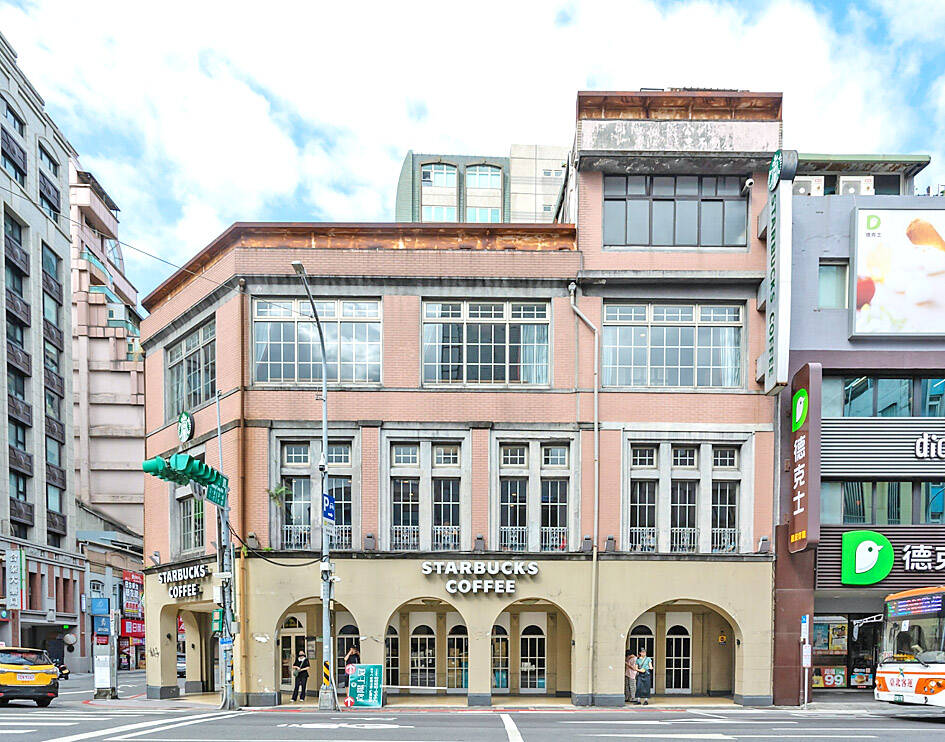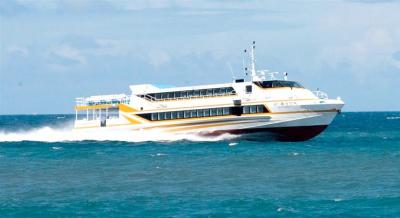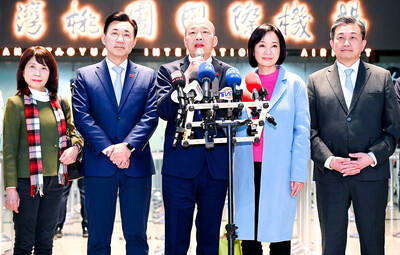A Japanese colonial-era building in Taipei’s Zhongzheng District (中正) that originally housed a branch of the Tsujiri tea shop has been granted heritage status by a Taipei City Government committee.
Constructed in 1912, the building at 104 Chongqing S Road Sec 1, currently home to a Starbucks, was officially recognized as a municipal monument due to its historical significance, said the review committee, which approved the measure at a meeting last week.
The building’s first floor previously housed the Tsujiri tea shop and Sakaicho District’s post office, and it witnessed the development and prosperity of the commercial area. Its second floor was used for residential purposes, architect Lu Ta-chi (呂大吉) told the meeting.

Photo courtesy of Lu Ta-chi’s office
Lu was at the meeting representing the building’s owners, who had filed the request for heritage status.
The building’s owners plan to restore it to its original appearance, Lu said.
Part of the tea shop’s significance stems from the social standing of its original owner, Tokusaburo Miyoshi, a Japanese colonial-era entrepreneur, who arrived in Taiwan with a recommendation letter from then governor-general Sukenori Kabayama and had connections among politicians and businesspeople.
After Japan’s surrender in World War II, the Tsujiri tea shop relocated in 1948 to Kyoto, Japan, where it continues to operate.
The building’s subsequent owner added a third floor in 1956.
However, the mansard roof, wooden flooring and original architectural form have been preserved, Lu said, adding that they can be restored to their original appearance.
The committee approved the application for heritage status based on the project team’s examination of the building in May and last month.
However, Lu would still be required to submit a detailed proposal and receive approval from the committee before work can begin on the planned restoration.

Death row inmate Huang Lin-kai (黃麟凱), who was convicted for the double murder of his former girlfriend and her mother, is to be executed at the Taipei Detention Center tonight, the Ministry of Justice announced. Huang, who was a military conscript at the time, was convicted for the rape and murder of his ex-girlfriend, surnamed Wang (王), and the murder of her mother, after breaking into their home on Oct. 1, 2013. Prosecutors cited anger over the breakup and a dispute about money as the motives behind the double homicide. This is the first time that Minister of Justice Cheng Ming-chien (鄭銘謙) has

Ferry operators are planning to provide a total of 1,429 journeys between Taiwan proper and its offshore islands to meet increased travel demand during the upcoming Lunar New Year holiday, the Maritime and Port Bureau said yesterday. The available number of ferry journeys on eight routes from Saturday next week to Feb. 2 is expected to meet a maximum transport capacity of 289,414 passengers, the bureau said in a news release. Meanwhile, a total of 396 journeys on the "small three links," which are direct ferries connecting Taiwan's Kinmen and Lienchiang counties with China's Fujian Province, are also being planned to accommodate

TRANSPORT CONVENIENCE: The new ticket gates would accept a variety of mobile payment methods, and buses would be installed with QR code readers for ease of use New ticketing gates for the Taipei metro system are expected to begin service in October, allowing users to swipe with cellphones and select credit cards partnered with Taipei Rapid Transit Corp (TRTC), the company said on Tuesday. TRTC said its gates in use are experiencing difficulty due to their age, as they were first installed in 2007. Maintenance is increasingly expensive and challenging as the manufacturing of components is halted or becoming harder to find, the company said. Currently, the gates only accept EasyCard, iPass and electronic icash tickets, or one-time-use tickets purchased at kiosks, the company said. Since 2023, the company said it

BITTERLY COLD: The inauguration ceremony for US president-elect Donald Trump has been moved indoors due to cold weather, with the new venue lacking capacity A delegation of cross-party lawmakers from Taiwan, led by Legislative Speaker Han Kuo-yu (韓國瑜), for the inauguration of US president-elect Donald Trump, would not be able to attend the ceremony, as it is being moved indoors due to forecasts of intense cold weather in Washington tomorrow. The inauguration ceremony for Trump and US vice president-elect JD Vance is to be held inside the Capitol Rotunda, which has a capacity of about 2,000 people. A person familiar with the issue yesterday said although the outdoor inauguration ceremony has been relocated, Taiwan’s legislative delegation has decided to head off to Washington as scheduled. The delegation